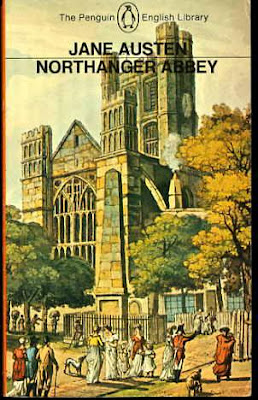I've heard from so many of you recently that you enjoy my book recommendations. I'm very glad! You can find hundreds of my book reviews...
Read MoreReading Is Sexy: Northanger Abbey… Meh
Someone warned me in a comment on my blog that Northanger Abbey is generally not favored among Jane Austen’s novels and might not be a good one with which to start my Jane Project. But it was a fine beginning for the Project because I’m determined to keep an open mind. I suspected this one might be a bit rough because it was Austen’s first novel. I certainly wouldn’t want strangers to read the first novel I wrote (which is safely tucked into a box in my studio closet, under stacks of other never-to-be-seen-by-other-eyes pieces of writing).
I’d hoped for a little more suspense in the “Gothic” part of the book. The heroine Catherine is, herself, taken with Gothic novels, particularly The Mysteries of Udolpho by Ann Radcliffe (which, it turns out, you can read right here, if you’re interested.) When Catherine is invited to visit Northanger Abbey, her imagination gets the better of her habitual common sense. She works herself into a tizzy until she’s convinced that her future husband Henry’s father has murdered his wife — or at least spirited her away to some far corner of the cloister as his prisoner. Of course, neither turn out to the case, and the passages describing Catherine’s investigation simultaneously dragged in their flatness and whizzed by, leaving me to think “that’s it?!” when I realized her flights of fancy were over. Many of the pivotal characters are rather shallow and unlikeable, from Catherine’s BFF Isabella (with whom the action really begins) and Isabella’s boorish brother, to the Allen family (Catherine’s hosts), and right on through to Henry’s older brother and much-venerated father, the General. I wouldn’t want to suffer through tea with any of that lot. The book is described as a satire, and it does a brilliant job in the early chapters of skewering the vapid social scene in Bath. But it does go on and one without actually taking the reader anywhere.
Many of the pivotal characters are rather shallow and unlikeable, from Catherine’s BFF Isabella (with whom the action really begins) and Isabella’s boorish brother, to the Allen family (Catherine’s hosts), and right on through to Henry’s older brother and much-venerated father, the General. I wouldn’t want to suffer through tea with any of that lot. The book is described as a satire, and it does a brilliant job in the early chapters of skewering the vapid social scene in Bath. But it does go on and one without actually taking the reader anywhere.
My preference is first-person narration — I like the intimacy of hearing a character speak their own mind — and third-person is a tough sell for me. I feel like Austen’s narrator in Northanger Abbey is too removed from the action, a very distant, somewhat cold observer. I don’t think the narrator likes any of the characters any more than I do! And maybe that’s the point — I leave that judgment to more educated reviewers than I.
In spite of all of the above nitpicks, I read the damn thing straight through. Started it yesterday, woke up in the middle of the night and read for two hours, ate my breakfast with one hand while I held the book with the other, then finished it off this afternoon. The climax of the story was somewhat anticlimactic, but I definitely had a nice feeling of things being settled and working out just the way they ought.
My rating: Meh
(On a scale of “Feels like homework” -> “Meh” -> “Read it NOW”)
Next up: Pride and Prejudice. In 2003 the BBC conducted the largest ever poll for the “UK’s Best-Loved Book.” Pride and Prejudice came in second, behind The Lord of the Rings — and there have been at least 10 film adaptations so the story definitely has legs.
Not everyone has affection for P&P, however. Charlotte Brontë wrote to critic and reviewer George Henry Lewes after he praised P&P in a review for Fraser’s Magazine in 1847. Brontë found the novel a disappointment: “…a carefully fenced, highly cultivated garden, with neat borders and delicate flowers; but…no open country, no fresh air, no blue hill, no bonny beck.”
That’s my girl!
More Like This...
Let's travel back in time to winter, 2016. My husband David and I were living in White River Junction, Vermont; he was studying for his...
Read More



